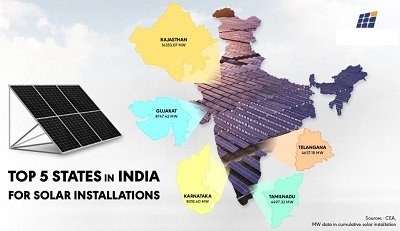AWIP, Economics, Environment & Ecology, Science & Technology
Q. What factors justify India’s significant potential for solar energy?
India has significant potential for solar energy due to a combination of geographical, environmental, economic, and policy factors. Here are the key factors that justify this potential:
Geographical Advantages
- High Solar Insolation: India receives ample sunlight throughout the year, with an average of 300 sunny days annually. This high solar insolation, especially in regions like Rajasthan, Gujarat, and Andhra Pradesh, provides an excellent basis for solar energy generation.
- Large Land Area: India has vast tracts of unused and arid land, particularly in states like Rajasthan and Gujarat, which are suitable for large-scale solar power projects.
Environmental Benefits
- Reduction in Greenhouse Gases: Solar energy is a clean, renewable source of energy that helps reduce greenhouse gas emissions. This is crucial for India, which is striving to reduce its carbon footprint and combat climate change.
- Reduction in Air Pollution: Utilizing solar energy can help mitigate air pollution caused by the burning of fossil fuels, contributing to improved air quality and public health.
Economic Factors
- Energy Security: Solar energy can help India reduce its dependence on imported fossil fuels, enhancing its energy security and reducing the trade deficit associated with energy imports.
- Job Creation: The solar energy sector has the potential to create millions of jobs in manufacturing, installation, maintenance, and research and development.
Technological and Policy Support
- Advancements in Technology: Improvements in solar panel efficiency, energy storage solutions, and grid integration technologies have made solar power more viable and cost-effective.
- Government Initiatives: The Indian government has implemented several policies and initiatives to promote solar energy, such as:
- National Solar Mission: Launched in 2010, it aims to achieve 100 GW of solar power capacity by 2022, with long-term targets extending to 2030.
- Subsidies and Incentives: Financial incentives, tax benefits, and subsidies are provided to encourage investment in solar energy projects.
- Regulatory Support: Policies like Renewable Purchase Obligations (RPOs) mandate that utilities purchase a certain percentage of their power from renewable sources, including solar.
Infrastructure and Investment
- Infrastructure Development: Investment in infrastructure, such as solar parks, grid connectivity, and transmission networks, has facilitated the growth of the solar energy sector.
- Foreign and Domestic Investment: The solar sector has attracted significant investment from both domestic and international players, contributing to the rapid expansion of solar capacity.
Global Leadership and Collaboration
- International Solar Alliance (ISA): India, along with France, spearheaded the formation of the ISA, an alliance of over 120 countries dedicated to promoting solar energy globally. This positions India as a leader in the global renewable energy movement and fosters international collaboration.
Socio-Economic Benefits
- Rural Electrification: Solar energy can play a crucial role in providing electricity to remote and rural areas where grid connectivity is challenging. Decentralized solar solutions like solar home systems and microgrids can enhance energy access and improve the quality of life.
- Sustainable Development: By promoting solar energy, India can achieve sustainable development goals, including affordable and clean energy, climate action, and economic growth.
Conclusion
India’s significant potential for solar energy is justified by its favorable geographical conditions, environmental benefits, economic advantages, technological advancements, supportive government policies, infrastructure development, and socio-economic benefits. These factors collectively position India to harness solar power effectively, contributing to energy security, economic growth, and sustainable development.


